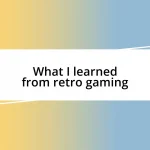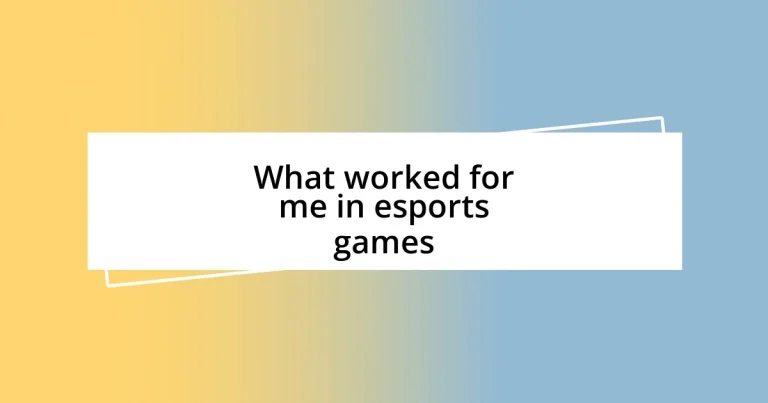Key takeaways:
- Identifying strengths through self-reflection and feedback enhances gaming performance and community connection.
- Developing structured practice routines that include varied activities leads to more effective skill improvement.
- Reflecting on experiences, both individually and with teammates, fosters growth and resilience in competitive gaming.

Understanding the esports landscape
The esports landscape is a vibrant and diverse ecosystem, filled with opportunities for gamers and fans alike. I still remember the first major tournament I attended; the buzz in the arena was electric. It made me realize just how passionate this community is, not just about winning but about the shared experience of competition.
As I navigated through different games and genres, I found that each has its own unique culture and dedicated fan base. For example, MOBAs like League of Legends cultivate teamwork and strategy, while first-person shooters like Counter-Strike focus more on individual skill and reflexes. Isn’t it fascinating how each game can foster such distinct camaraderie among players?
The business side of esports often surprised me, too. Sponsorships, merchandise sales, and streaming revenues create a robust financial ecosystem that supports the entire industry. I often wonder how far esports can go; the growing viewership and innovation suggest that we’ve barely scratched the surface of what’s possible.
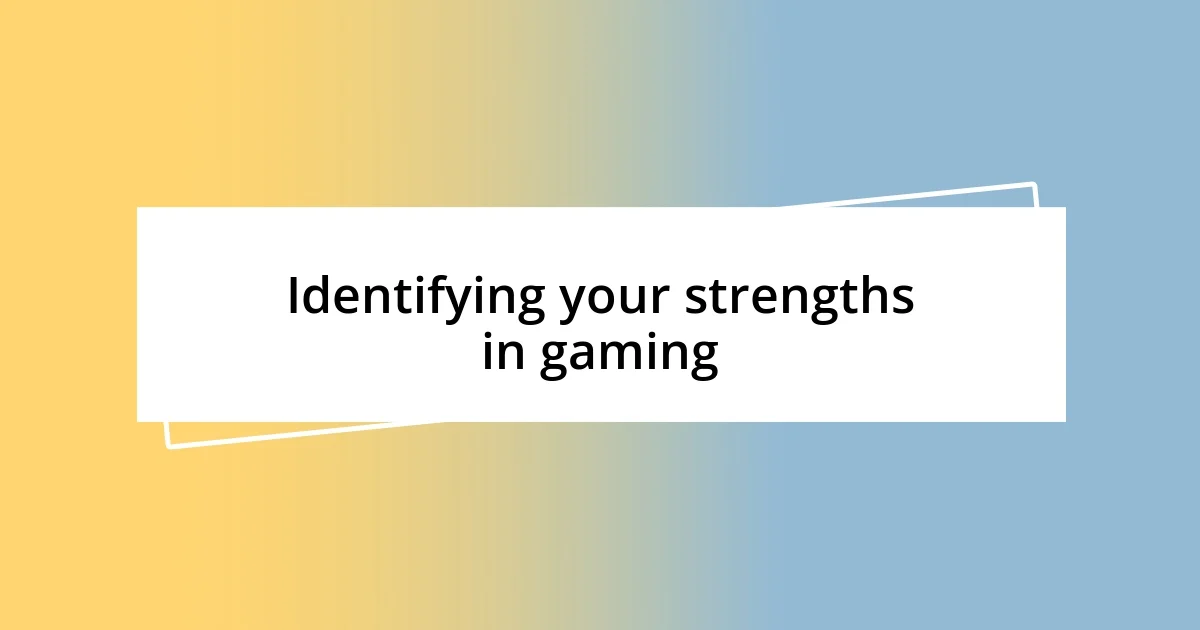
Identifying your strengths in gaming
Identifying your strengths in gaming requires a bit of self-reflection. I remember when I first started gaming seriously; I wasn’t sure where I fit in. I tried various roles and discovered that my ability to strategize and read opponents in real-time was my strong suit. It felt like unlocking a hidden level in a game when I recognized this.
Taking a step back to evaluate my gameplay was enlightening. By analyzing my performance in different matches, I could pinpoint specific areas where I excelled, whether it was map awareness in shooters or communication in team-based games. The moment I identified these strengths, my confidence skyrocketed, translating into better performance and an overall enjoyable experience.
Moreover, seeking feedback from my teammates helped me understand where I shone and where I could improve. Their insights often highlighted strengths I hadn’t even considered, like my adaptability in high-pressure situations. This collaborative approach not only built my skills but also strengthened my connection with the gaming community.
| Strengths | Examples |
|---|---|
| Strategizing | Effective map control in strategy games |
| Communication | Leading team discussions during crucial moments |
| Adaptability | Adjusting tactics mid-game based on opponent behavior |
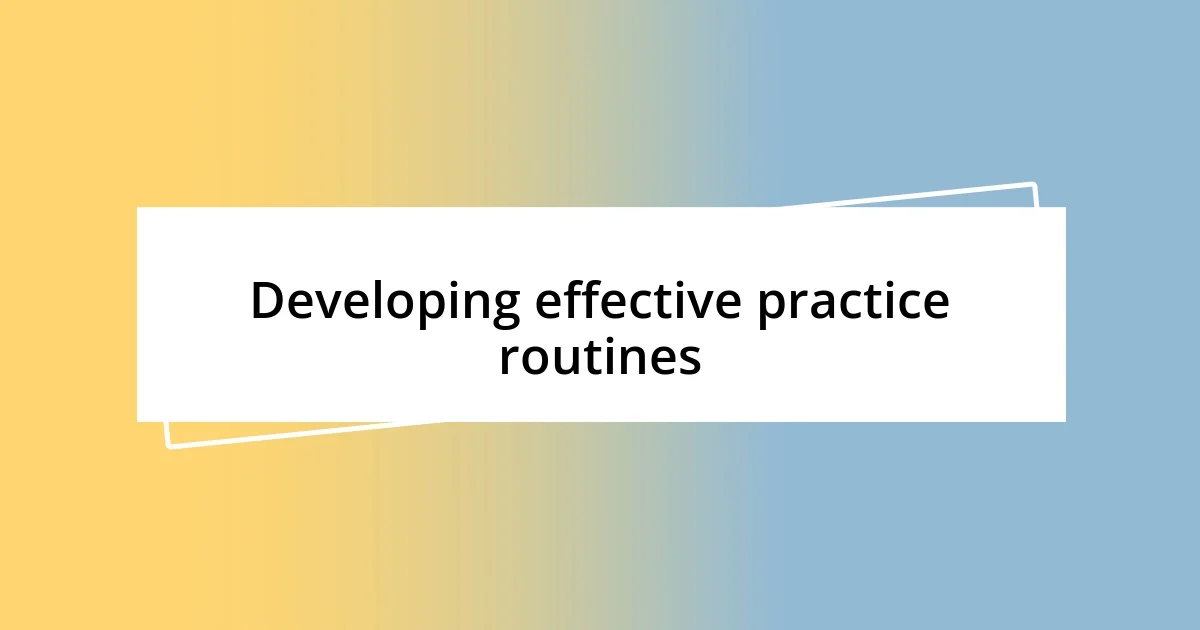
Developing effective practice routines
Developing effective practice routines
Creating a practice routine is vital for any aspiring esports athlete. I still recall the days when I would jump from game to game without any structure. This chaotic approach left me frustrated and worn out. Once I started developing a consistent routine, everything changed. By focusing on specific skills each session, I saw steady improvement and felt more confident in my gameplay.
When devising a routine, think about incorporating a mix of activities that cater to your development. Here are some key components I found useful:
- Warm-up drills: Short sessions to enhance mechanics and reaction time.
- Focused skill sessions: Concentrate on one specific aspect, like aim training or map knowledge.
- Gameplay reviews: Analyzing gameplay helps identify weaknesses and track progress.
- Physical exercise: Keeping the body active supports mental sharpness.
- Rest blocks: Scheduling breaks to prevent burnout ensures sustainability in practice.
Each element plays a significant role, and I’ve discovered that keeping it varied not only maintains my interest but also addresses different areas of my gaming performance. Embracing these routines made my practice sessions much more productive—and honestly, I started looking forward to them. There’s a sense of satisfaction in seeing the gradual improvement, and that’s what keeps you coming back for more!
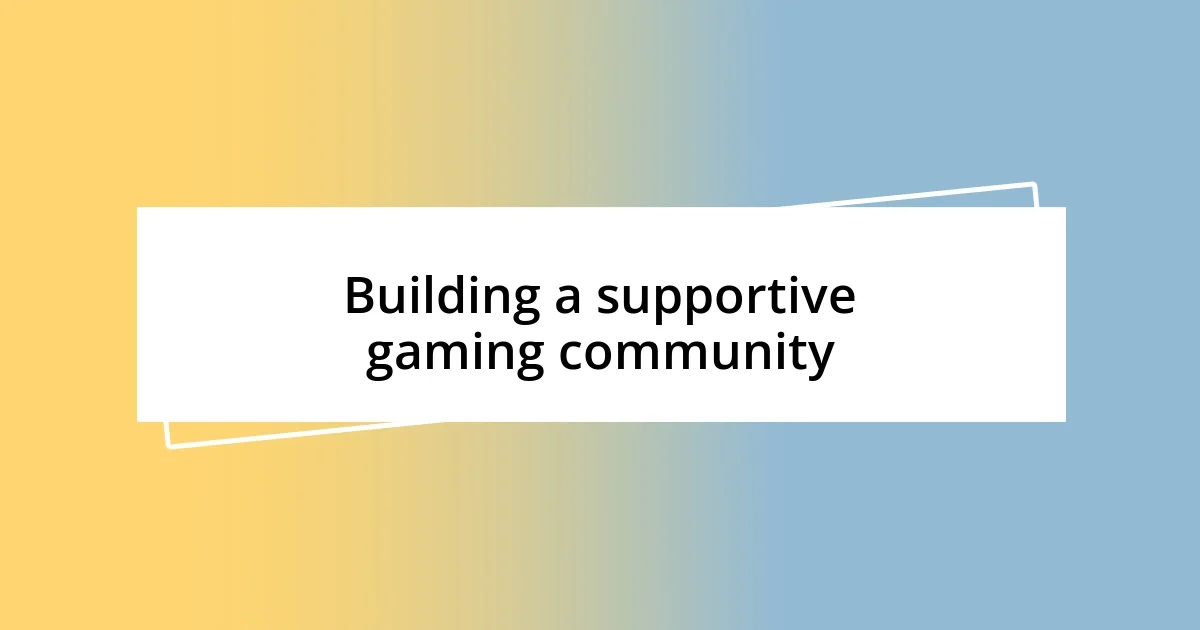
Building a supportive gaming community
Building a supportive gaming community has been one of the most rewarding experiences in my gaming journey. I vividly recall the early days when I joined online forums, excited but also a bit intimidated. It was in these spaces that I found players who not only shared tips but also encouraged one another through tough matches. I’ve often wondered: what would my gaming skills look like today without that initial support? It’s difficult to say, but connecting with others truly made a difference.
Engaging with a community goes beyond just sharing victories. I remember when I participated in my first local tournament; the atmosphere was electric yet daunting. The nerves were palpable as I waited to compete, but the warm words of encouragement from my fellow players calmed my racing mind. I realized then that it’s not just about individual success, but rather lifting each other up that creates a vibrant gaming culture. This experience taught me that forging friendships through shared experiences cultivates an environment where players feel safe to express themselves and grow.
Creating that sense of belonging takes a little effort, but it’s worth it. I started organizing casual game nights with friends and inviting newcomers, and the response was heartwarming. Watching less experienced players tackle challenges and improve over time filled me with a sense of pride. It’s incredible to see how a simple gesture of inclusion can spark someone’s passion for gaming. So, think about how you can contribute to the community around you—how might your actions inspire others to flourish in their own gaming adventures?
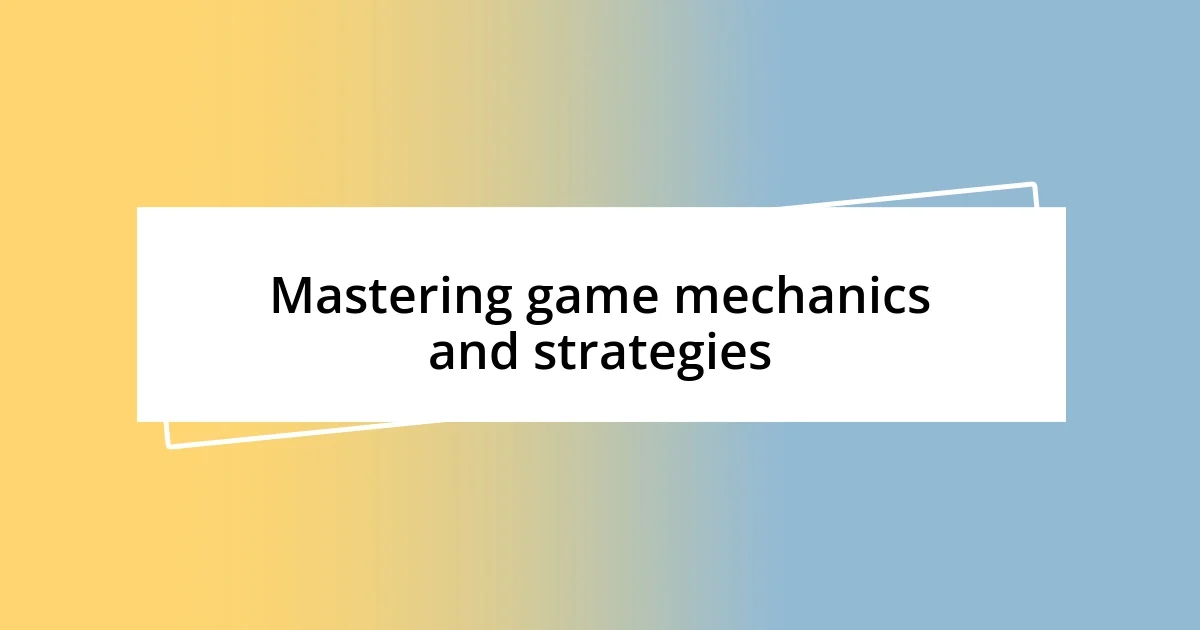
Mastering game mechanics and strategies
Mastering game mechanics is a journey that requires dedicated effort and a curious mindset. I remember the first time I really focused on perfecting my movement in a competitive shooter. Initially, it felt tedious, but as I drilled the basics over and over, I started to see improvement in my positioning and reaction times. Have you ever had that “aha!” moment when everything clicks? It’s exhilarating, and that feeling kept me pushing forward.
Then there’s strategy. I learned quickly that just knowing how to shoot or where to run isn’t enough. During my early competitive days, I often played without a plan, which resulted in losses that could have been easily avoided. By studying professional matches and breaking down key plays, I discovered the importance of map awareness and team coordination. My eyes were opened to the complexities of setups and engages. Have you looked beyond your gameplay to learn from others? It can be a game-changer.
Finally, integrating what you learn into your gameplay is essential. I recall a pivotal tournament where I tried out new strategies that I had practiced beforehand. At first, I was nervous and questioned whether I could execute them under pressure. But, to my surprise, sticking to my strategy led to a significant victory. Isn’t it amazing how preparation can bolster your confidence? Embracing both mechanics and strategy has truly transformed my approach to esports, leading me to victories I once thought were out of reach.
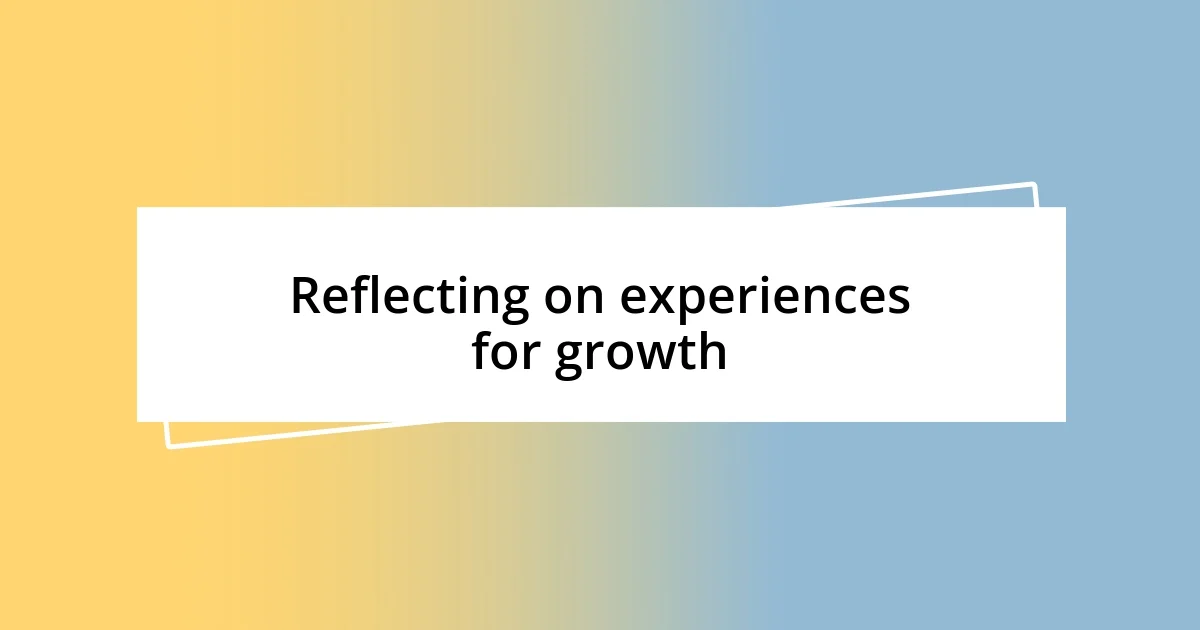
Reflecting on experiences for growth
Reflecting on my experiences in esports has been an illuminating process. I often find myself thinking back to difficult matches where I felt overwhelmed. In those moments, I learned that adversity is not just an obstacle but a stepping stone for growth. Have you ever taken time to analyze your losses? I’ve discovered that reviewing what went wrong often revealed patterns that I could address, paving the way for improvement in future games.
One of the most impactful moments for me was when I faced a particularly tough opponent in a tournament. After the match, I took a step back to evaluate my strategies and decision-making under pressure. Not only did this reflection help me understand my weaknesses, but it also sparked a desire to enhance my mental game. It’s so interesting how each loss can teach us more than a win ever could, don’t you think? I realized that a level-headed approach, even in defeat, fosters resilience and better prepares me for the challenges ahead.
Going beyond individual introspection, I’ve found that sharing experiences with teammates is invaluable too. I remember sitting down with my team after a tournament loss, and we laid out what went right and what didn’t. During our discussions, different perspectives provided insights that I hadn’t considered. This collaborative reflection not only built camaraderie but also cultivated a stronger strategic foundation for our future matches. Have you thought about how much you can learn by engaging with your team on this level? It truly enhances growth in ways I never anticipated.






